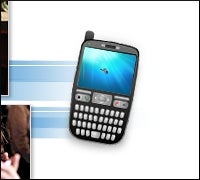 |
| A detail from Microsoft’s Windows 7 site, and a sign of things to come? |
A graphic on the Windows 7 site is fanning the flames of rumors that Microsoft will port its forthcoming PC operating system to smartphones. But even analysts who once entertained the thought are now doubting it will happen — or should.
The artwork shows the Windows 7 desktop on a smartphone. Microsoft has given no hints of porting the upcoming operating system to mobile devices.
But observers have seen some reasons why extending Windows 7 to the desktop may make sense. Windows Mobile has been plagued with delays, with its version 6.5 only recently being announced. Windows Mobile 7 doesn’t have a timeline at all.
Windows 7, on the other hand, continues to be lauded, is rapidly approaching a release candidate state and Microsoft has already said it would run on tiny, low-powered netbooks. For instance, Asus, maker of the popular Eee PC netbook, announced at the Mobile World Congress show a 3.5G-equipped Eee PC running Windows 7, giving users high-speed mobile broadband connectivity.
It also wouldn’t be the first time a major OS vendor whittles down its desktop OS for mobile phone use — that’s the same play Apple followed in developing the iPhone. And Microsoft’s not afraid to dabble in porting its flagship OS to different devices: pieces of the Windows subsystem found their way to the Xbox operating system, for instance.
A Microsoft spokesperson declined to comment on the rumors. Still, all this has made for what some in the blogosphere believe are compelling hints on Microsoft’s plans.
But analysts say it’s not a good idea.
“I don’t think it will happen. [The artwork] is not indicative of a roadmap. It’s more of a we-can-see-this-playing-everywhere kind of statement then it’s something-we’re-going-to-do,” said Roger Kay, president of Endpoint Technologies.
A few months back, Kay was keen on the idea of putting Windows 7 on mobile devices. Now, he’s not so sure. “Although it’s intriguing to see it, there are two issues preventing it,” he told InternetNews.com.
Both concerns relate to the difficulty in porting Windows 7 — complex creation for x86 platforms — for a platform based on the ARM processor, for which Windows Mobile is written.
“Although Windows 7 has a smaller footprint than Vista, it doesn’t have a small enough footprint to go into a phone,” he added. “And given the architectural differences between ARM and x86, it’s likely they would have to recraft Windows in its entirety on that platform.”
Philippe Winthrop, director of the Global Wireless Practice for Strategy Analytics, is even more pointed in his view.
“It would be a terrible idea,” he told InternetNews.com. “While a mobile device such as a smartphone may have strong computing capabilities, fundamentally, the way people interact with it is very different from the way they interact with a laptop or desktop.”
One of the differences between Microsoft and Apple is Microsoft has a lot of existing mobile apps, and changing fundamental operating system cores would break all that. “Apple had the luxury of starting from scratch. Microsoft does not have that luxury,” Winthrop said.
Bring on the services
The analysts are in agreement when it comes to something else: Windows Mobile would be best served by making Windows services available to smartphones, not the desktop OS.
“It seems to make more sense to do it at a services level than at an internals levels,” said Kay. “Specifically, data record structures, so they can exchange fairly profound information, so your phone can be coordinate with everything you do on a PC.”
[cob:Special_Report]Microsoft’s Mesh initiative points to doing something like that, Kay added. “Mesh is a technology Microsoft will use to coordinate mobile platforms, but it’s done at a much higher level, not at an OS level. So I think the thrust at Microsoft will be to use Mesh and not shoehorn Windows 7 on a mobile platform.”
Winthrop was of the same mind. “If they can marry the relevant services, such as Live, Azure, the stuff that’s all about cloud computing, it’s all about the services that can be leveraged regardless of being on the desktop or mobile,” he said.
“Smart, appropriate, tight integration between the two platforms will create the Windows experience. I’m not saying you can do Photoshop on your mobile phone, but you will have a recognizable experience,” Winthrop added.


